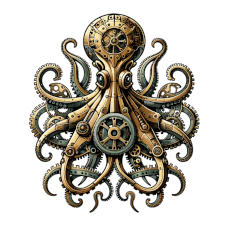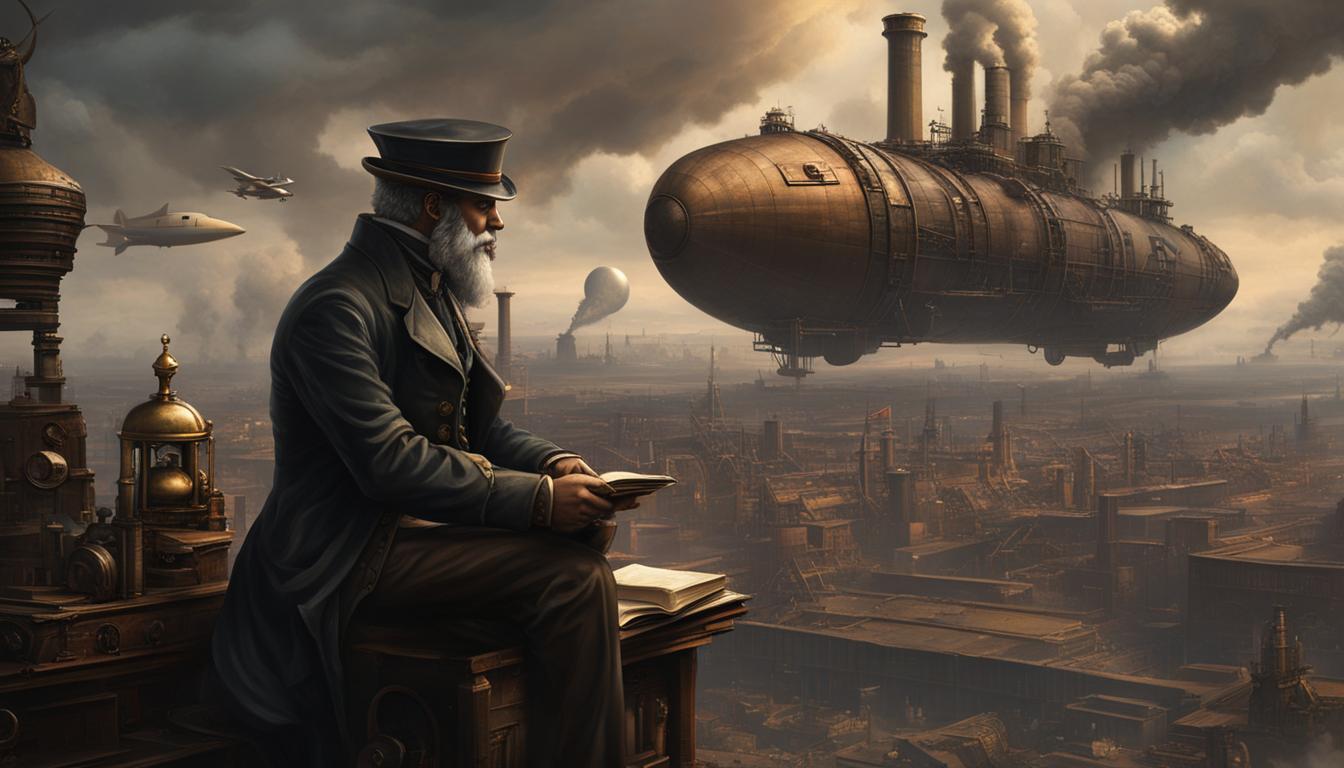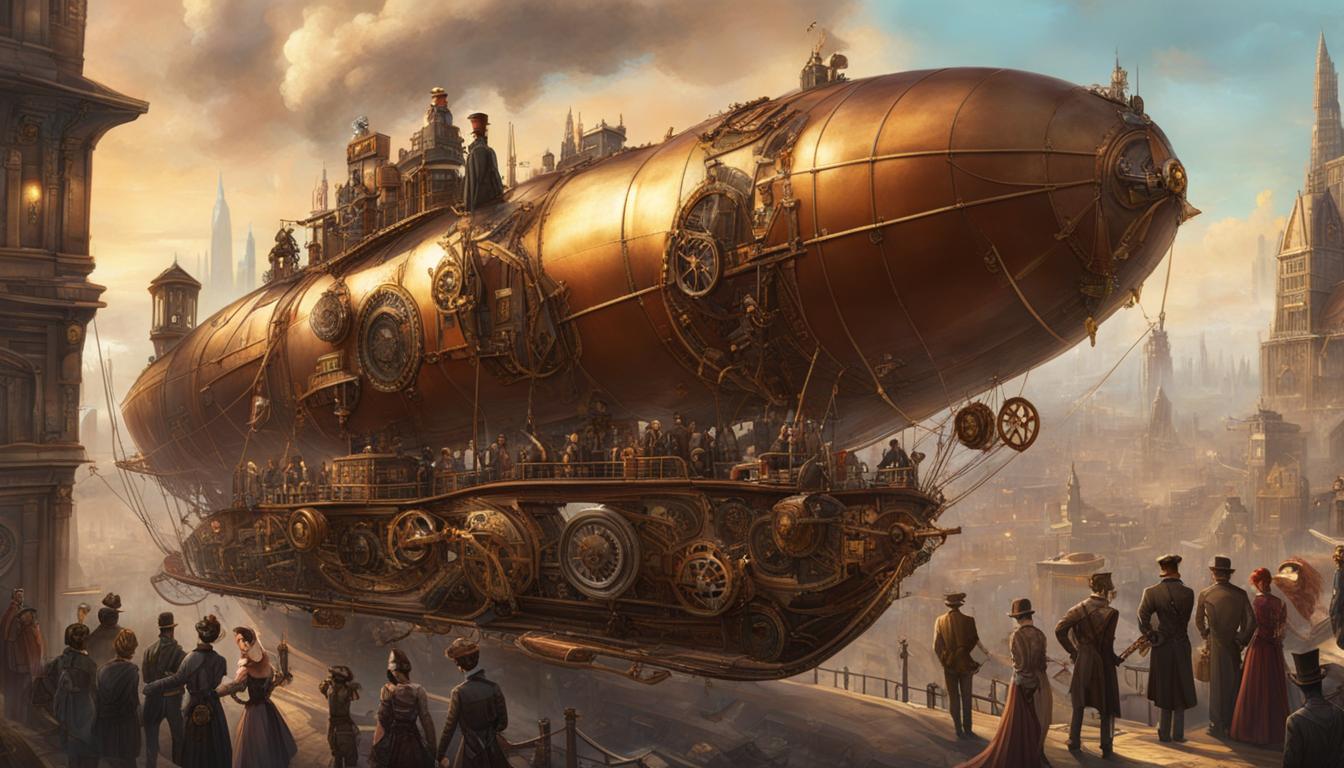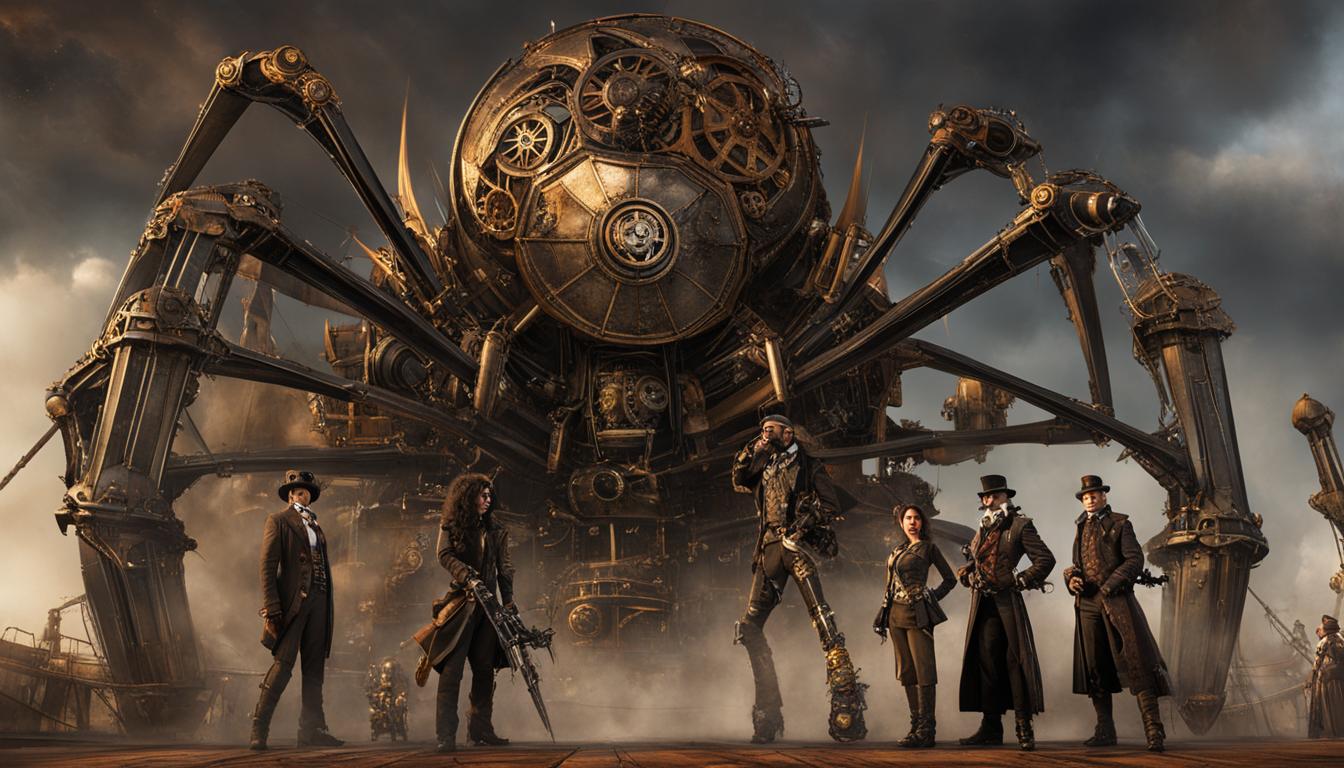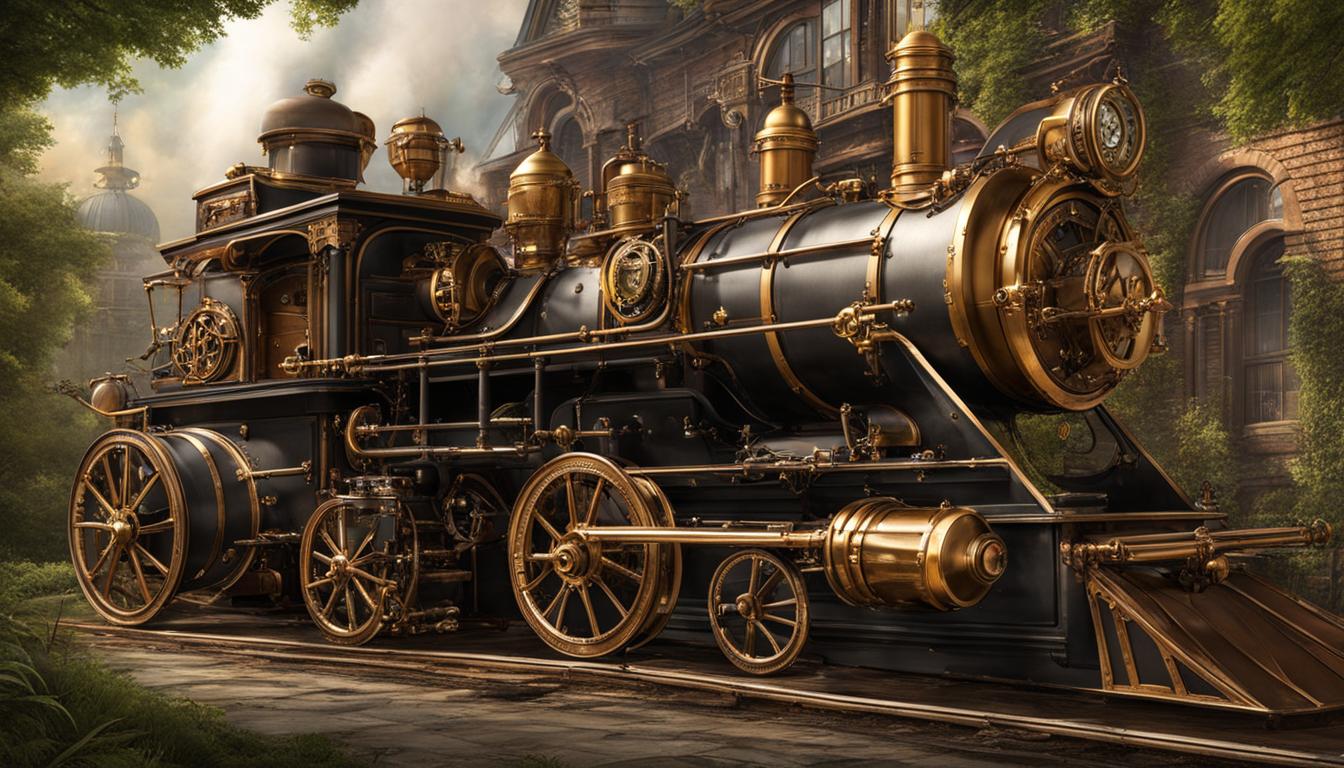Steampunk, a genre known for its combination of Victorian aesthetics and futuristic technology, is not just about gears and gadgets. It also delves into the depths of philosophy, drawing inspiration from influential thinkers to add depth and intellectual richness to its narratives. One philosopher that frequently finds his way into steampunk tales is Friedrich Nietzsche, with his ideas of individual power and the rejection of traditional morality. Through these references, steampunk explores themes of rebellion and exploration within a fantastical Victorian setting.
But Nietzsche is not the only philosopher to make an appearance in the world of steampunk. Other influential thinkers like Jean-Paul Sartre and Albert Camus, known for their contributions to existentialism, are also commonly referenced. Their ideas of authenticity and the search for meaning resonate with the themes of self-discovery and questioning societal norms found in steampunk. By incorporating these philosophical references, steampunk creates a space for readers and viewers to engage with existential themes in a unique and captivating way.
So, why does steampunk embrace philosophy? Because it adds intellectual depth to the genre. It prompts us to ponder existential questions, explore the conflict between tradition and progress, and contemplate the ethical implications of technology. Steampunk becomes more than just an aesthetic; it becomes a vessel for philosophical exploration within a mesmerizing Victorian world.
Key Takeaways:
- Steampunk incorporates references to influential philosophers like Friedrich Nietzsche, Jean-Paul Sartre, and Albert Camus.
- By drawing from philosophy, steampunk adds depth and intellectual richness to its narratives.
- Existential themes, the conflict between tradition and progress, and ethical implications of technology are common philosophical explorations in steampunk.
- Steampunk provides a unique and captivating way to engage with philosophical ideas within a fantastical Victorian setting.
Victorian Philosophical Debates in Steampunk
Steampunk, with its fusion of Victorian aesthetics and futuristic technology, not only draws inspiration from major philosophical thinkers but also engages with the philosophical debates that emerged during the Victorian era. These debates pitted traditional religious beliefs against the rise of science and reason, resulting in discussions on morality, individual agency, and the potential for progress through technology.
Thinkers like Thomas Carlyle and John Stuart Mill grappled with these questions, and their ideas find resonance in steampunk narratives. Steampunk stories often incorporate elements of moral ambiguity, exploring the complexities of right and wrong. They also emphasize the role of the individual in shaping society, empowering characters to challenge the status quo and pursue their own path.
A table comparing the main philosophical debates in Victorian era and their presence in steampunk:
| Victorian Philosophical Debates | Steampunk Themes |
|---|---|
| Conflict between traditional religious beliefs and science | The tension between magic and technological advancement |
| Discussion on the nature of morality | Exploration of moral ambiguity and the blurring of ethical boundaries |
| Role of the individual in society | Emphasis on individual agency and rebellion against societal norms |
| Potential for progress through technology | Exploration of the transformative power of technology |
By referencing these philosophical debates, steampunk adds an intellectual depth to its narratives, allowing readers and viewers to engage with timeless philosophical questions within a fantastical Victorian setting.
Philosophical Schools in Steampunk Narratives
Steampunk narratives offer a rich tapestry of philosophical influences, drawing from various schools of thought to explore existential themes and provoke contemplation. Within the genre, philosophical schools such as existentialism and utilitarianism are commonly represented, providing a unique lens through which to examine timeless philosophical questions in a steampunk setting.
Existentialism is a prominent philosophical school referenced in steampunk narratives. It explores the individual’s search for meaning and authenticity in a seemingly chaotic world. Steampunk often incorporates these themes by featuring characters who grapple with existential dilemmas and strive to define their own purpose in a society driven by technological advancements.
“In the steam-filled streets of Victorian London, the protagonist wrestles with the futility of conformity and embarks on a journey of self-discovery, questioning the very essence of existence in a world governed by progress and machines.” – Steampunk novel
Utilitarianism, another philosophical school, is also frequently represented in steampunk narratives. This ethical framework emphasizes the maximization of happiness for the greatest number of people. Steampunk stories often explore the potential consequences and moral implications of technological advancements through the lens of utilitarianism.
The combination of these philosophical schools within the steampunk genre provides a compelling intellectual landscape for readers and viewers. It encourages contemplation of fundamental questions about human nature, morality, and the impact of technology on society. Steampunk’s interpretation of philosophical ideas adds depth and complexity to its narratives, offering a thought-provoking and engaging experience for enthusiasts.

| Philosophical Schools | Steampunk Themes |
|---|---|
| Existentialism | Individual search for meaning and authenticity |
| Utilitarianism | Moral implications of technological advancements |
Steampunk Characters Inspired by Real Philosophers
In the world of steampunk, characters are often brought to life through the influence of real philosophers, adding depth and philosophical ideologies to the genre. These characters embody the principles and ideas of renowned philosophers, creating multidimensional personalities that reflect the philosophical concepts present in steampunk settings.
One such example is the steampunk character inspired by Friedrich Nietzsche’s concept of the “Ubermensch.” This character embraces Nietzsche’s philosophy of the exceptional individual who rises above societal constraints and pursues their own power and ambitions. In a steampunk narrative, this character would embody the rebellious spirit and ambition that Nietzsche’s ideas encompass, challenging traditional norms and forging their own path.
Another influential philosopher in steampunk is Soren Kierkegaard, whose existential dread can be seen in certain characters. These characters grapple with the question of existence, confronting their own mortality and the meaning of life. By incorporating Kierkegaard’s ideas, steampunk narratives delve into the depths of human nature and the individual’s search for authenticity in a world filled with advanced technology and societal expectations.
“The steampunk genre allows for the exploration of complex philosophical concepts through its characters, drawing inspiration from real philosophers. It adds intellectual depth to the genre and invites readers and viewers to engage with philosophical ideologies within a captivating Victorian-inspired world.”
By drawing inspiration from real philosophers, steampunk offers a unique and thought-provoking experience. These characters act as vessels for philosophical ideologies, allowing readers and viewers to explore profound questions about human nature, morality, and the role of technology in society. Steampunk’s incorporation of real philosophers adds rich layers to its narratives, creating a genre that is both intellectually stimulating and visually captivating.
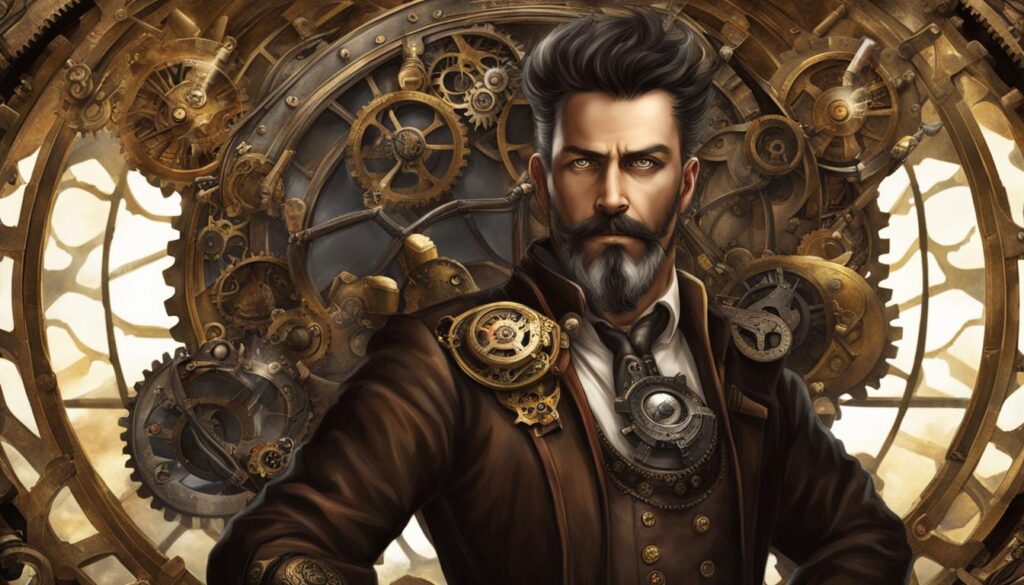
Table: Steampunk Characters Inspired by Real Philosophers
| Character | Inspired Philosopher | Philosophical Ideologies |
|---|---|---|
| Evelyn Blackwood | Friedrich Nietzsche | Embracing individual power and ambition |
| Victor Sterling | Soren Kierkegaard | Exploring existential dread and the search for meaning |
| Isabella Hawthorne | Jean-Paul Sartre | Questioning societal norms and exploring personal freedom |
Ethical Frameworks Referenced in Steampunk
Steampunk not only draws inspiration from philosophical thinkers but also references various ethical frameworks in its narratives. These references provide a thought-provoking exploration of the moral implications of the genre’s technological advancements. One prominent framework often referenced in steampunk is that of Enlightenment thinkers, including Immanuel Kant and John Locke. These philosophers’ ideas on individual rights, knowledge, and power resonate within the steampunk world, sparking discussions on personal liberty, societal responsibility, and the ethics of progress.
Steampunk’s take on Enlightenment thinkers can be seen in its portrayal of characters who grapple with the moral complexities of their technological advancements. These characters, often torn between their desire for progress and the potential consequences of their actions, mirror the philosophical dilemmas posed by thinkers like Kant and Locke. Through these narratives, steampunk invites its audience to critically examine the ethical implications of scientific and technological development, encouraging them to consider the responsibilities that come with wielding power.
Furthermore, steampunk also explores the tension between individual agency and social constructs, an idea that can be linked to both Enlightenment thinkers and contemporary ethical frameworks. It raises questions about the balance between personal freedom and societal obligations, offering a nuanced perspective on the challenges faced by individuals navigating a rapidly changing world. By intertwining these ethical frameworks into its narratives, steampunk prompts its audience to reflect on the complexities of moral decision-making and the ethical dimensions of progress.

In summary, steampunk delves into the ethical terrain by referencing various frameworks and thinkers, particularly those from the Enlightenment era. These references serve as a catalyst for exploring questions about individual rights, societal responsibilities, and the ethical implications of progress. By incorporating these ethical dimensions into its narratives, steampunk offers a captivating and intellectually stimulating experience that challenges readers and viewers to contemplate the moral complexities of the genre’s fantastical Victorian world.
Steampunk’s Interpretation of Classic Philosophical Works
Steampunk, with its distinctive blend of Victorian aesthetics and futuristic technology, offers a unique interpretation of classic philosophical works. By reimagining these works within a steampunk setting, the genre adds a fresh and thought-provoking perspective to timeless ideas. One example of this is the reinterpretation of Thomas Hobbes’ “Leviathan,” where a steam-powered society governed by automatons showcases the concept of the “social contract.” This creative twist on a classic philosophical work invites readers and viewers to explore the implications of technological advancements on societal structures.
Another notable interpretation can be seen in how steampunk incorporates Enlightenment thinkers such as Immanuel Kant and John Locke. Through references to these philosophers, steampunk delves into ethical frameworks and prompts discussions about individual rights, the pursuit of knowledge, and the responsibilities of those in positions of power. By contextualizing these philosophical ideas within a fantastical Victorian world, steampunk offers a fresh take on the ideals of the Enlightenment era.
Table:
| Classic Philosophical Work | Steampunk Interpretation |
|---|---|
| Thomas Hobbes’ “Leviathan” | A steam-powered society governed by automatons exploring the concept of the “social contract.” |
| Immanuel Kant’s ethical frameworks | Discussions about individual rights, the pursuit of knowledge, and the responsibilities of those in positions of power within a fantastical Victorian world. |
Through its innovative reinterpretation of classic philosophical works, steampunk invites audiences to engage with profound ideas in a visually captivating and intellectually stimulating manner. By weaving together Victorian aesthetics, futuristic technology, and philosophical concepts, the genre creates a rich tapestry that challenges and explores the depth of human thought.

Conclusion
As the steampunk genre continues to captivate audiences with its unique blend of Victorian aesthetics and futuristic technology, it becomes evident that philosophy plays a significant role in shaping its narratives. Philosophical thinkers have left their mark on steampunk, enriching the genre with their profound ideas and challenging concepts. From Friedrich Nietzsche’s exploration of power and morality to existentialist philosophies that delve into the search for meaning, steampunk draws inspiration from a diverse range of philosophical influences.
By incorporating references to major philosophers and their ideologies, steampunk offers a thought-provoking and intellectually engaging experience. These philosophical influences add depth and complexity to the narratives, allowing readers and viewers to explore profound questions about morality, individual agency, and the consequences of technological progress. Steampunk becomes a gateway for philosophical exploration within the fantastical world of Victorian-inspired innovation.
Characters in steampunk stories often embody the ideas of real philosophers, providing a platform to delve into complex philosophical concepts. Whether it’s the embodiment of Friedrich Nietzsche’s “Ubermensch” or the existential dread of Soren Kierkegaard, these characters allow steampunk to explore philosophical ideologies within its imaginative settings.
Steampunk also reimagines classic philosophical works, putting a Victorian twist on timeless ideas. By offering a fresh interpretation of foundational texts, such as Thomas Hobbes’ “Leviathan,” steampunk sparks creativity and encourages contemplation of these influential works. Through this reinterpretation, steampunk fans are treated to a captivating fusion of philosophical ideas and the boundless possibilities of a steampunk world.
FAQ
How does steampunk incorporate references to philosophical thinkers?
Steampunk often incorporates references to major philosophical thinkers such as Friedrich Nietzsche, Jean-Paul Sartre, and Albert Camus. These references add depth and philosophical depth to the genre, allowing readers and viewers to explore existential themes within a fantastical Victorian setting.
What philosophical debates from the Victorian era are explored in steampunk?
Steampunk stories often draw inspiration from the debates between traditional religious beliefs and the rise of science and reason that emerged during the Victorian era. Thinkers like Thomas Carlyle and John Stuart Mill grappled with questions about morality, individual agency, and the transformative power of technology, which are frequently incorporated into steampunk narratives.
What philosophical schools are represented in steampunk narratives?
Steampunk often engages with philosophical schools like existentialism, which focuses on the individual’s search for meaning and authenticity, as well as utilitarianism, which explores the ethical implications of maximizing happiness for the greatest number of people. Additionally, steampunk reimagines classic philosophical works, putting a Victorian twist on texts such as Plato’s “Republic” or Descartes’ “Meditations.”
Do steampunk characters embody the ideas of real philosophers?
Yes, steampunk often features characters who are inspired by or embody the ideas of real philosophers. For example, a steampunk character may embody Friedrich Nietzsche’s concept of the “Ubermensch” or reflect the existential dread of Soren Kierkegaard. These characters allow steampunk storytellers to explore complex philosophical concepts within their narratives.
What ethical frameworks are referenced in steampunk?
Steampunk frequently references ethical frameworks from thinkers like Immanuel Kant and John Locke, who were influential during the Enlightenment period. These references prompt discussions about concepts such as individual rights, the pursuit of knowledge, and the responsibility of those in positions of power.
How does steampunk reinterpret classic philosophical works?
Steampunk offers its own interpretation of classic philosophical works by reimagining them within its Victorian-inspired world. For example, it might explore the concept of the “social contract” from Thomas Hobbes’ “Leviathan” by envisioning a society governed by steam-powered automatons. This adds a unique twist to the genre and allows for creative and thought-provoking explorations of timeless ideas within a steampunk setting.
